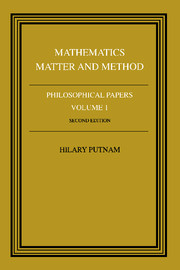Book contents
- Frontmatter
- Contents
- Dedication
- Introduction
- 1 Truth and necessity in mathematics
- 2 The thesis that mathematics is logic
- 3 Mathematics without foundations
- 4 What is mathematical truth?
- 5 Philosophy of physics
- 6 An examination of Grünbaum's philosophy of geometry
- 7 A philosopher looks at quantum mechanics
- 8 Discussion: comments on comments on comments: a reply to Margenau and Wigner
- 9 Three-valued logic
- 10 The logic of quantum mechanics
- 11 Time and physical geometry
- 12 Memo on ‘conventionalism’
- 13 What theories are not
- 14 Craig's theorem
- 15 It ain't necessarily so
- 16 The ‘corroboration’ of theories
- 17 ‘Degree of confirmation’ and inductive logic
- 18 Probability and confirmation
- 19 On properties
- 20 Philosophy of Logic
- Bibliography
- Index
8 - Discussion: comments on comments on comments: a reply to Margenau and Wigner
Published online by Cambridge University Press: 04 August 2010
- Frontmatter
- Contents
- Dedication
- Introduction
- 1 Truth and necessity in mathematics
- 2 The thesis that mathematics is logic
- 3 Mathematics without foundations
- 4 What is mathematical truth?
- 5 Philosophy of physics
- 6 An examination of Grünbaum's philosophy of geometry
- 7 A philosopher looks at quantum mechanics
- 8 Discussion: comments on comments on comments: a reply to Margenau and Wigner
- 9 Three-valued logic
- 10 The logic of quantum mechanics
- 11 Time and physical geometry
- 12 Memo on ‘conventionalism’
- 13 What theories are not
- 14 Craig's theorem
- 15 It ain't necessarily so
- 16 The ‘corroboration’ of theories
- 17 ‘Degree of confirmation’ and inductive logic
- 18 Probability and confirmation
- 19 On properties
- 20 Philosophy of Logic
- Bibliography
- Index
Summary
The Margenau and Wigner ‘Comments’ (1962) on my ‘Comments on the Paper of David Sharp’ (Putnam, 1961; Sharp, 1961) is a strange document. First the authors say, in effect, ‘had anything been wrong (with the fundamentals of quantum mechanics) we should certainly have heard’. Then they issue various obiter dicta (e.g. the ‘cut between observer and object’ is unavoidable in quantum mechanics; the – highly subjectivistic – London-Bauer treatment of quantum mechanics is described, along with von Neumann's book, as ‘the most compact and explicit formulation of the conceptual structure of quantum mechanics’). My assumption 2 (that the whole universe is a system) is described as ‘not supportable’, because ‘the measurement is an interaction between the object and the observer’. The ‘object’ (the closed system) cannot include the observer.
The issues involved in this discussion are fundamental ones. I believe that the conceptual structure of quantum mechanics today is as unhealthy as the conceptual structure of the calculus was at the time Berkeley's famous criticism was issued. For this reason – as much to emphasize the seriousness of the present situation in the foundations of quantum mechanics as to remove confusions that may be left in the mind of the general reader upon reading the Margenau and Wigner ‘Comments’ – I intend to restate the main points of my previous ‘Comments’, and to show in detail why the Margenau and Wigner remarks fail completely to meet them.
Information
- Type
- Chapter
- Information
- Mathematics, Matter and MethodPhilosophical Papers, pp. 159 - 165Publisher: Cambridge University PressPrint publication year: 1979
